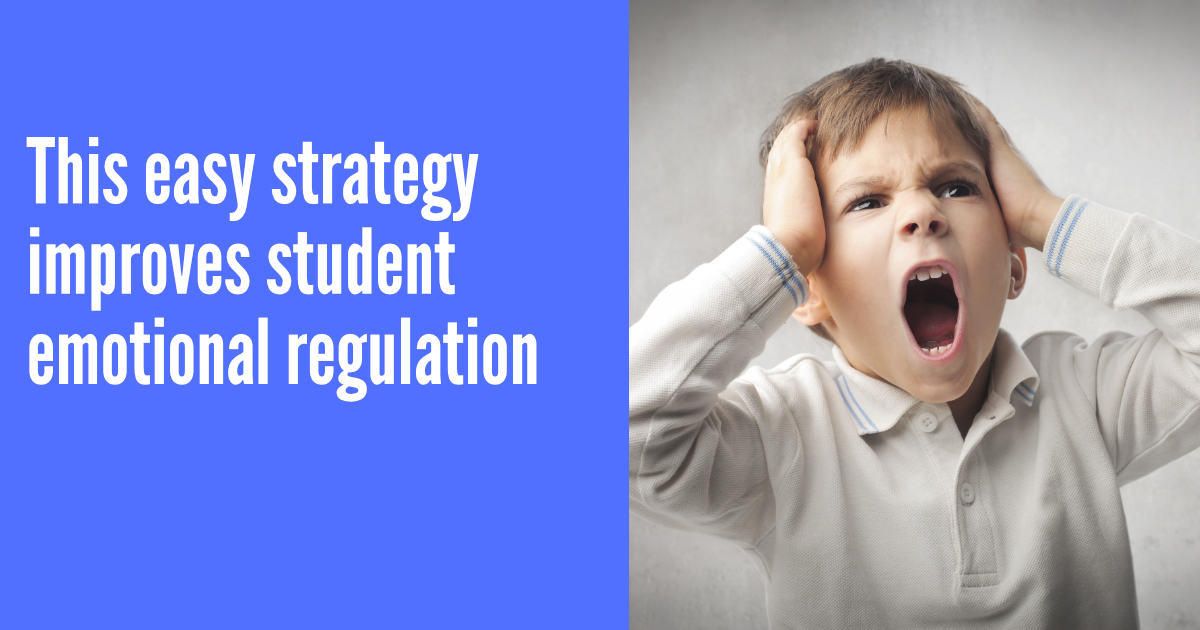Teaching students with emotional difficulties is ____________.
What word did you pick?
- Stressful
- Exhausting
- Tiring
- All three?
(Maybe something with four letters?)
That’s why getting the right approach in the classroom is so important. Not just for that individual student, but for wellbeing of all the other students and the adults.
The problem for teachers is: where do we get simple, practical ways of supporting those students?
Robert Aymer is a therapist who draws on over 20 years of working with children, young people and families.
During his work in school classrooms, he noticed that many children with emotional difficulties shared a common difficulty…
…and then he developed a solution that impacted on their classroom behaviour.
Interested?
Here’s my interview with Robert:
Q. You spend a lot of time working with students with emotional difficulties in school. What behaviours were you seeing from those students in the classroom?
I got involved because teachers were describing issues such as children going under tables, refusing to engage in the lesson and coming into class unsettled, particularly in the mornings.
This is a difficult situation for them to manage because:
- Children are often unable or unwilling to say what happened to cause their behaviour
- Teachers are left to try and figure out what the problem is
- These situations also unsettle other children in the classroom
Q. You came up with a solution. What was the impact on classroom behaviour?
Some of the highlights have been where staff has spoken to me about how much more manageable children have become and the fact that emotional outbursts were less extreme and frequent.
Q. Using your expertise as a therapist, what did you realise was the common problem driving those behaviours?
The single biggest problem, in my opinion, is the lack of ability some children have to express themselves emotionally.
We must do more to support children with the expression of their feelings.
This means we must help them to identify what they are feeling and give them the language to describe it (emotional literacy).
If we can do this, they will not feel the need to suppress their feelings as much, which results in behavioural problems.
Q. How did you arrive at your solution?
I was looking for a system that would allow children to express their feelings in a very simple and practical way. I was also extremely keen to create stronger links between school and home.
I wanted something that would allow children to capture happy moments and instances where they had succeeded in doing something, however small.
That’s when I hit on the idea of a daily feelings diary – a way of students checking, and becoming more aware of, their emotions on a moment-by-moment basis.
(To find out more about the power of this technique, see our article on ‘checking in‘.)
I have found that when children display persistent behaviour problems, the narrative around them can become completely negative and this creates a downward spiral of negativity.
If we are to help children caught in that cycle, we must find whatever glimmer of positivity there is and maximise it.
The diary allows this to happen whether from the home environment to school or vice versa.
Q. Tell us about your diary and how it’s used.
The diary remains the property of the child and he/she is at liberty to allow parents and teachers to place comments in it, which adds context to the emotion (face) that the child has chosen, or the child can enter a comment itself.
In this way, we are supporting their emotional expression.
The diary also creates a means of monitoring the mood of a child over time, which is very useful if a referral is to be made or further support sought out.
The ideal way to use the diary would be to:
- Let the child know that expressing feelings is healthy and that this is why it has been provided
- Ask the child to think about how their day has gone and select a face to show how they feel/have felt
- Ask the child to add a comment however brief, or if it is something they have done with a parent or in class, let the adult/teacher congratulate them in the comment section and praise them for what they accomplished.
Q. How have the students reacted to using the diary?
For one child, having the diary opened up a previously limited dialogue between him and his parent.
Whereas previously he tended to want to keep what was written in there to himself, he began showing his mother the dairy, opening up a channel for them to talk about his feelings.
Q. What has been the impact been in the classroom?
The biggest impact has been on teachers, learning how effective it is to build on a positive, rather than negative narrative.
There is a key piece of thinking that has always stayed with me from my family therapy training and it is that families and individuals cannot change under a negative connotation.
Focusing on the negative, problematic behaviour increases the feelings of negativity – which are then displayed through behaviour.
Whereas focusing on the instances of positivity and success (however small) does the opposite.
Q. What’s the biggest piece of advice you would give our readers?
The single biggest piece of advice I would give to teachers is to find the time to engage with children on an emotional level, particularly where they have something they have done well or are proud of.
However busy you think you are, problematic behaviour always creates time for itself, because someone will have to deal with it.
In some cases the head teacher may have to come and deal with a situation and/or you may need to clear a classroom to bring a situation under control.
When you look at it that way, it is better to do all you can proactively – to give a few moments to a child, to check in on their emotional state and to see whether there are any successes that you can celebrate with them.
If you can do this more, what you will be doing is:
- creating some positive attention to build the confidence of that child for the classroom environment
- making him/her more responsive to you
- helping them to settle and be ready to learn.
Q. How can our readers get hold of your resource?
The diary is available by following the link below, where orders can be placed via phone or email.
Special offer for Beacon subscribers:
There’s no better time to start a new intervention that the new year. That’s why Robert has agreed to give Beacon subscribers a special offer if they order their diaries ready for January.
Order your feelings diaries before Friday 14th December 2018, quoting the code BEACON in your correspondence, and save 10% off your order.

